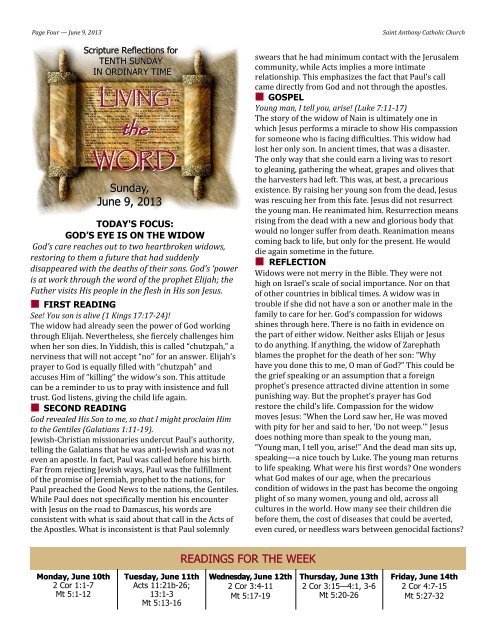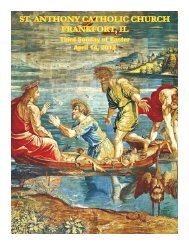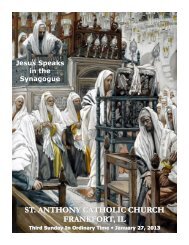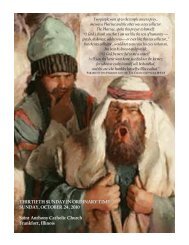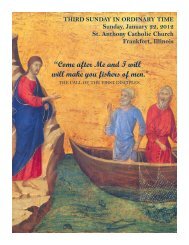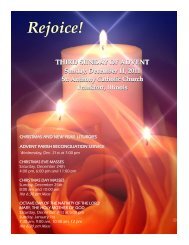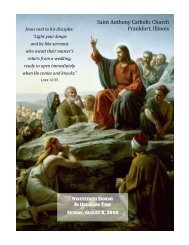saint anthony catholic church frankfort, il saint anthony catholic ...
saint anthony catholic church frankfort, il saint anthony catholic ...
saint anthony catholic church frankfort, il saint anthony catholic ...
Create successful ePaper yourself
Turn your PDF publications into a flip-book with our unique Google optimized e-Paper software.
Page Four — June 9, 2013<br />
Scripture Reflections for<br />
TENTH SUNDAY<br />
IN ORDINARY TIME<br />
LIVING<br />
the<br />
WORD<br />
Sunday,<br />
June 9, 2013<br />
TODAY'S FOCUS:<br />
GOD’S EYE IS ON THE WIDOW<br />
God’s care reaches out to two heartbroken widows,<br />
restoring to them a future that had suddenly<br />
disappeared with the deaths of their sons. God’s ‘power<br />
is at work through the word of the prophet Elijah; the<br />
Father visits His people in the flesh in His son Jesus.<br />
• FIRST READING<br />
See! You son is alive (1 Kings 17:17-24)!<br />
The widow had already seen the power of God working<br />
through Elijah. Nevertheless, she fiercely challenges him<br />
when her son dies. In Yiddish, this is called “chutzpah,” a<br />
nerviness that w<strong>il</strong>l not accept “no” for an answer. Elijah’s<br />
prayer to God is equally f<strong>il</strong>led with “chutzpah” and<br />
accuses Him of “k<strong>il</strong>ling” the widow’s son. This attitude<br />
can be a reminder to us to pray with insistence and full<br />
trust. God listens, giving the ch<strong>il</strong>d life again.<br />
• SECOND READING<br />
God revealed His Son to me, so that I might proclaim Him<br />
to the Gent<strong>il</strong>es (Galatians 1:11-19).<br />
Jewish-Christian missionaries undercut Paul’s authority,<br />
telling the Galatians that he was anti-Jewish and was not<br />
even an apostle. In fact, Paul was called before his birth.<br />
Far from rejecting Jewish ways, Paul was the fulf<strong>il</strong>lment<br />
of the promise of Jeremiah, prophet to the nations, for<br />
Paul preached the Good News to the nations, the Gent<strong>il</strong>es.<br />
Wh<strong>il</strong>e Paul does not specifically mention his encounter<br />
with Jesus on the road to Damascus, his words are<br />
consistent with what is said about that call in the Acts of<br />
the Apostles. What is inconsistent is that Paul solemnly<br />
Saint Anthony Catholic Church<br />
swears that he had minimum contact with the Jerusalem<br />
community, wh<strong>il</strong>e Acts implies a more intimate<br />
relationship. This emphasizes the fact that Paul’s call<br />
came directly from God and not through the apostles.<br />
• GOSPEL<br />
Young man, I tell you, arise! (Luke 7:11-17)<br />
The story of the widow of Nain is ultimately one in<br />
which Jesus performs a miracle to show His compassion<br />
for someone who is facing difficulties. This widow had<br />
lost her only son. In ancient times, that was a disaster.<br />
The only way that she could earn a living was to resort<br />
to gleaning, gathering the wheat, grapes and olives that<br />
the harvesters had left. This was, at best, a precarious<br />
existence. By raising her young son from the dead, Jesus<br />
was rescuing her from this fate. Jesus did not resurrect<br />
the young man. He reanimated him. Resurrection means<br />
rising from the dead with a new and glorious body that<br />
would no longer suffer from death. Reanimation means<br />
coming back to life, but only for the present. He would<br />
die again sometime in the future.<br />
• REFLECTION<br />
Widows were not merry in the Bible. They were not<br />
high on Israel’s scale of social importance. Nor on that<br />
of other countries in biblical times. A widow was in<br />
trouble if she did not have a son or another male in the<br />
fam<strong>il</strong>y to care for her. God’s compassion for widows<br />
shines through here. There is no faith in evidence on<br />
the part of either widow. Neither asks Elijah or Jesus<br />
to do anything. If anything, the widow of Zarephath<br />
blames the prophet for the death of her son: “Why<br />
have you done this to me, O man of God?” This could be<br />
the grief speaking or an assumption that a foreign<br />
prophet’s presence attracted divine attention in some<br />
punishing way. But the prophet’s prayer has God<br />
restore the ch<strong>il</strong>d’s life. Compassion for the widow<br />
moves Jesus: “When the Lord saw her, He was moved<br />
with pity for her and said to her, ‘Do not weep.’” Jesus<br />
does nothing more than speak to the young man,<br />
“Young man, I tell you, arise!” And the dead man sits up,<br />
speaking—a nice touch by Luke. The young man returns<br />
to life speaking. What were his first words? One wonders<br />
what God makes of our age, when the precarious<br />
condition of widows in the past has become the ongoing<br />
plight of so many women, young and old, across all<br />
cultures in the world. How many see their ch<strong>il</strong>dren die<br />
before them, the cost of diseases that could be averted,<br />
even cured, or needless wars between genocidal factions?<br />
READINGS FOR THE WEEK<br />
Monday, June 10th<br />
2 Cor 1:1-7<br />
Mt 5:1-12<br />
Tuesday, June 11th<br />
Acts 11:21b-26;<br />
13:1-3<br />
Mt 5:13-16<br />
Wednesday, June 12th<br />
2 Cor 3:4-11<br />
Mt 5:17-19<br />
Thursday, June 13th<br />
2 Cor 3:15—4:1, 3-6<br />
Mt 5:20-26<br />
Friday, June 14th<br />
2 Cor 4:7-15<br />
Mt 5:27-32


